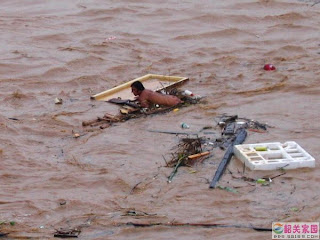Anglo-Saxon attitudes?

What is it about the English-speaking world and its inability to get to grips with climate change? I ask this because, when you look at the situation here in the
We all know about the Bush administration and its craven assaults on the environment. With just over a year left in office, the Chimp King is doing his darnedest to throw bones to his buddies in the polluting industries: blowing the tops of mountains in Appalachia, vetoing any progressive bill that comes from Congress, fighting international efforts to slow climate change, turning the EPA into a federal opponent of state attempts to reduce transport emissions… the list of infamy goes on and on.
But Bush isn’t alone in being ready, for the profits vested interests, to destroy our future. Stephen Harper, the Canadian Prime Minister, was happy this week to announce that his country had no hope of reaching its
As for Australia: well, it looks like we might finally see the back of the odious John Howard, who is currently trailing Kevin Rudd six weeks before a general election. Until we do (and I won’t believe it until Howard has taken up a consolation seat at the Heritage Foundation in
But these are all nasty, right-wing politicians, right? Surely our own, New Labour government doesn’t belong in their malodorous company? Alas and alack, Gordon Brown is proving to be worthy of his surname, as he wriggles out of his predecessor’s commitments on renewable energy, steadfastly ignores the demands of a growing number of businesses for governmental assurances on green investments, and balks at the prospect of spending even the tiniest fraction of money his own advisor, Sir Nicholas Stern, insists must be spent if we are to avoid the ruinous consequences of man-made climate change. Why is it that a country with the largest renewable energy potential in Europe is lagging far behind
Ah, but political will is what’s missing throughout the Anglo-Saxon world. Hooked like the most abject of junkies on an unsustainable model of laissez faire capitalism, endowed with a remarkable capacity for self-deception and blind to the vast potential for economic prosperity embodied in what Germans are rightly calling a Second Industrial Revolution, the Axis of Albion seems unequal to the task of building a sustainable future. Is it because sod-you libertarianism is too deeply entrenched in our culture? Will progress forever be hobbled by our ferociously reactionary media, as dominated by the like of Rupert Murdoch, Paul Dacre and the reclusive Barclay brothers? Readers of this blog – if there are any – will be used, by now, to my pessimism about our species’ prospects of making it through to a third millennium. I hope to God my prognoses are mistaken and that we get through the bottleneck. But even if we do, what chance that future historians won’t view with contempt the environmental crimes of our present ‘Anglo-Saxon’ leaders?












